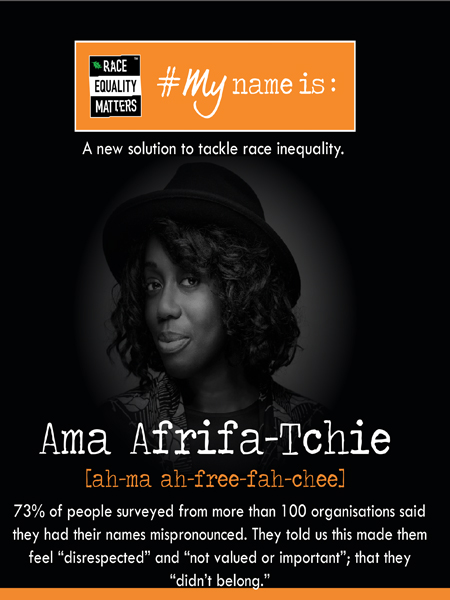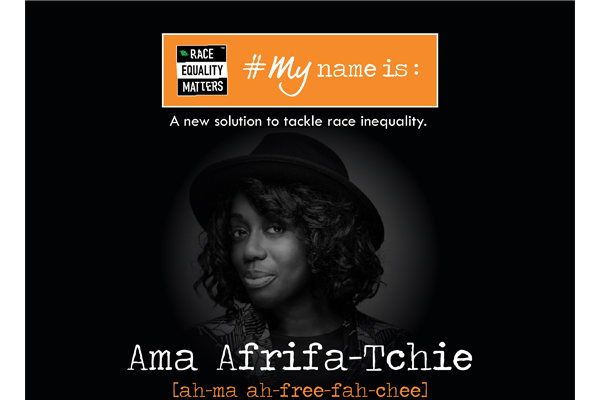In this week’s guest column, Javed Thomas, CEO of The Collaboratory & Co-founder of Race Equality Matters, outlines the importance of correctly pronouncing people’s names, why he’s launched the #MyNameIs initiative, and why employers should back it.
Around 73% of people surveyed from more than 100 organisations said they had their names mispronounced. They told us this made them feel “disrespected” and “not valued or important”; that they “didn’t belong”. Additionally, 88% thought a phonetic name spelling campaign would help tackle race inequality.
So, we started the #MyNameIs initiatiave. The campaign is a simple but significant gesture to get people’s names promounced correctly. It might sound like a trivial thing, but names are our identities; linking us to family, culture and heritage. Getting them wrong sends a subtle message; ‘you’re not important enough for me to care’. We all get names wrong sometimes, but we can and should do better. With #MyNameIs, we’ve developed a solution that’s almost as easy as ABC. Here’s how one basic act of politeness can make a meaningful impact.
MISPRONOUNCED NAMES
Imagine the following scenario… this morning, you have a meeting with someone you’ve never met before. You’ve arranged it over email, so you’ve seen their name written down. The only problem is that you don’t know how to say it. What do you do? For an enormous number of people, the answer is nothing at all. Whether it’s awkwardness, carelessness, laziness or for some other reason, an astonishing number of people stumble through meetings (and life), mangling monikers – and mispronouncing names.
In fact, some 73% of ethnic minorities reported that they’ve had their names pronounced incorrectly in the past, according to a recent Race Equality Matters Survey from more than 100 organisations. And they’re not alone. In April 2021, the actress Thandiwe Newton announced that she was reclaiming the lost ‘w’ that had been “carelessly” dropped from her first acting credit (Thandie). “That’s my name. It’s always been my name. I’m taking back what’s mine,” she stated to media. Thandiwe now goes by her original name correctly pronounced as “tan-DEE-way”.
RIGHT NAME PRONUNCIATION MATTERS
But why does getting names right matter so much? After all, most mispronunciations are usually innocent mistakes. That may well be true, but such inattention still has a negative effect. Organisational psychologist and leadership expert, Joyce E. A. Russell, stated that: “A person’s name is the greatest connection to their own identity and individuality. Some might say it is the most important word in the world to that person… It is a sign of courtesy… When someone remembers our name after meeting us, we feel respected and more important.”
In short, our names are intimately tied to our self-image; to who we are as individuals. Your parents picked your name from millions of options and chose it just for you. When we get someone’s name right, it makes them feel accepted, comfortable and gives them a sense of belonging. When we don’t, it does the opposite. And that can undermine inclusion in the workplace. If employers are going to tell their teams ‘bring your whole self to work’, they need to make sure people are called by their whole, correct names. There’s no excuse. Putting aside the inclusion argument, it’s just good manners.

One of the defences that is sometimes invoked is that some names are difficult. Yes, that’s true. But we’ve all learned to pronounce Tchaikovsky, Michelangelo and Dostoevsky. The worst thing to do is to give someone an anglicised version of their name – or an entirely new one – to make life easier, for instance, Bob for Bhaskara (derived from Sanskrit and means shining, glittering) or Effy for Efemena (which means “here is my wealth” in Urhobo. This isn’t just insulting; it takes away the meaning of someone’s name and separates them from their culture.
A COMMON SENSE SOLUTION
Getting someone’s name right is more than basic politeness. It’s about dignity, respect and inclusion. And that’s why we’re championing a common sense solution. The #MyNameIs campaign encourages everyone to add the phonetic spelling of their name to their email signature and other business materials. There are several ways to do it – here are some examples:
- Thandiwe Newton [tan-DEE-way] /tɑn–dɪː-wæ/
- Bijal Patel [Be-Jul-Pat-ell ‘as in well’] /bə-ʒʌl/ /pɑt-ɛl/
- Ama Afrifa-Tchie [Ah-ma Ah-free-fah-Chee] /ɑ-mɑ/ /ɑ-fɪː-fɑ-chɪː/
- Ngoc Nguyen [nock” “WIN] /nʌk/ /wɪn/
With gender pronouns already a common sight on emails, it’s no great leap. If you go into your email settings now, it will take two minutes. That is why we are calling on all organisations and companies to add phonetic spelling to their email signatures. Will you be one of the first 1000 to join this campaign and create more inclusion in the workplace?
QUICK SIMPLE WINS
Three quick simple wins that will help to get name pronunciation right and boost inclusion efforts, include:
- Add it to email signatures.
- Have meetings attendees names phonetic spelled in advance.
- ask for phonetic spellings in advance of clients and suppliers.
Not sure how to write your name? Our #MyNameIs guide offers lots of other common sense suggestions for getting other people’s names correct. We also have a launch of the Race equality Week #MyNameIs campaign on 16 November at 12.30pm. Click here for more details.

ABOUT THE AUTHOR
Javed Thomas, CEO of The Collaboratory, co-founded Race Equality Matters and Race Equality Week with Green Park’s CEO Raj Tulsiani. Thomas is an innovator in tackling key societal issues. This includes creating and driving initiatives and programmes that has tackled issues including mental health, D&I, the skills gap, disability and disadvantaged families, children and young people. He excels in creating collaborations to co-create solutions that make a meaningful impact. Thomas created and developed numerous campaigns which have been scaled and gone global including The Green Ribbon campaign for mental health, She Can Be and City Giving Day. He has delivered projects for five Lord Mayors and created the Lord Mayor’s Appeal’s Vetter City for All Strategy, which has engaged more than 1,000 organisations. Additionally, Thomas has engaged with over 500 commercial organisations, thousands of employees and over 100 charities to create award-winning collaborations that benefit communities and societies overall.
Click here to find out how Race Equality Week helps to address racial inequality within the workplace; and how the event aims to help leaders move from just talking about race to actually taking meaningful action for a real impact.





































